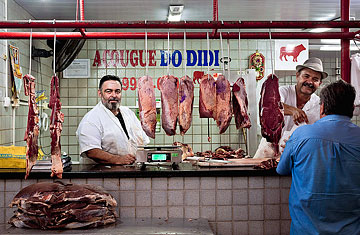
Red vs. green Rising incomes give more people a taste for meat, which is costlier to produce than vegetables
(3 of 3)
In addition, we need better technology. Our only way out of the crisis is to develop hardier, more productive seeds, new techniques to conserve dwindling water resources and other sustainable innovations. Even simple improvements can make a huge difference, especially for poor, small-scale farmers, whose productivity is still low. Agricultural giant Syngenta, for example, has developed a system for rice farmers that combines specially prepared seedlings and mechanized planting to produce up to 30% more per paddy with the same amount of water. "We have the technology and resources to solve the problem," says Hafez Ghanem, assistant director-general of the FAO in Rome. "What is needed is the political will."
Food markets require fixing as well. There is no comprehensive source of information on global production and reserves of major food grains, which leaves traders and government officials guessing and sometimes jolts prices. The G-20 is attempting to solve this problem with an international data system for major commodities, which could reduce price volatility while allowing the market to do its job.
We also need to improve distribution, especially in poor nations. Too much food simply rots in the countryside because warehousing and transportation networks are lacking. In West Timor in Indonesia, for example, an NGO gave farmers seeds for cashew trees about a decade ago, but they had little access to customers. In 2009 a group of Asian investors set up a processing plant in the area and began buying and marketing the cashews, providing cash for the poor farmers and nuts for the world — all for an investment of only $500,000.
Economist Adam Smith, a more optimistic contemporary of Malthus', believed that free markets solve problems like food shortages. Scarcity signals opportunity, and that attracts investment, stimulates production and encourages innovation. We can see signs of that today. Responding to lofty prices, U.S. corn farmers this year planted the second largest amount of acreage since World War II. American ag giant Monsanto spent $1.2 billion on R&D in its 2010 fiscal year, 54% more than in 2007. And with prices high, farmers have more reason to try the new stuff emerging from corporate labs. "What is a farmer going to do?" asks Syngenta CFO John Ramsay. "He is going to be incentivized to go for yields."
Not everyone, however, thinks the profit motive is best for the future of food. Critics of agribusiness complain that it hooks farmers on expensive patented plant varieties and pushes potentially unsafe technologies like genetic modification. Organizations like the Consultative Group on International Agricultural Research support labs that are trying to develop better rice, maize and other grains. But these groups don't command the resources of the big firms. Nor can we easily dismiss what the industry invents. Biotech, whether environmentalists like it or not, may have to be part of the food solution. "It may be a politically contentious discussion, but we simply don't have the luxury to abandon a potential tool like biotech," says Charles Godfray, a population biologist at the University of Oxford.
Yet even these improvements may not be sufficient. Farmers will confront unprecedented challenges in the years ahead. Some studies suggest that climate change could alter agricultural areas in large swaths of the developing world. The U.N.'s Intergovernmental Panel on Climate Change has projected that a temperature increase of 3°C could raise the price of food by 40%. Nor can we count on the intensive use of water to propel future gains in output, as we have in the past. While many Indian farmers do without irrigation, half the world's population lives in areas where water tables are falling as a result of excessive irrigation. How we manage our freshwater resources will be key to solving the food problem.
For 200 years Malthus has been wrong because he underestimated human ingenuity in overcoming the limitations of our environment. But there's no guarantee we will continue to do so, at least if we remain on our present course. The story of food is a cautionary one about the consequences of neglecting what truly affects life and death. "It's quite possible that we've passed a tipping point and we haven't realized it yet," says Brown of the Earth Policy Institute. Enjoy your dinner tonight. While you can still afford it.
—with reporting by Bryan Walsh / New York, Tim Padgett / Miami and Jyoti Thottam and Nilanjana Bhowmick / New Delhi
